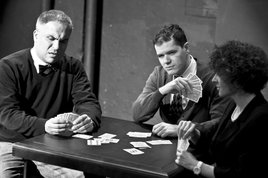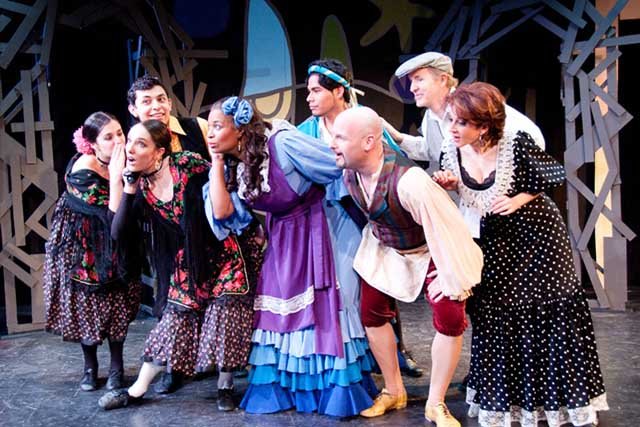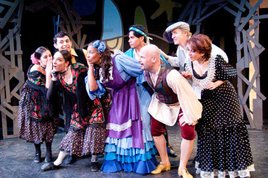WASHINGTON, January 12, 2012 – The In Series has scored again, adding a new chapter to its increasingly popular mini-opera double-bill programs. The company’s latest successful iteration, “Barber & Barberillo” pairs Samuel Barber’s rarely heard miniature, A Hand of Bridge, with Francisco Arsenio Barbieri’s economical two-act zarzuela, El barberillo de Lavapiés (The Little Barber of Lavapiés).
While the Series’ past double-bills have tended to reflect each other in terms of mood and content, the current pairing is a bit more disparate. The short Barber work, clocking in somewhere around twelve minutes in duration, is a short, quietly brutal 1959 look into the kind of dangling conversations and superficial smiles that were soon to figure into pop music in the 1960s.
Set, quite simply, at a card table around which two unhappy couples are playing a desultory game of bridge, Giancarlo Menotti’s acidic little libretto operates on two emotional planes. There’s the card game, of course, where the players carry on typically enigmatic little riffs meant to narrate the game or deceive their opponents. But each player, in sequence, mentally pulls out of the game to engage in a personal reverie, none of which casts his or her relationship in a very positive light.
Alienation was a theme that was quite prominent in the two decades following the Second World War, as personal relationships between the sexes—distorted and utterly changed as a result of that conflict—became difficult, complicated further by loosened sexual mores and the rise of a new, more militant feminism. Marital dissatisfaction became a hot topic. While TV’s “Ozzie and Harriet,” and, perhaps, “Leave It to Beaver” may have been Hollywood’s idealized version of the American family, the truth was far more complex, and it’s this that Barber’s short opera explores.
Most audiences, including this reviewer, have never encountered a live performance of Bridge, likely because it fits no comfortable performance niche. It’s too short and intimate to somehow include in a symphony concert. It’s also a bit too large for the chamber mode, nor does it lend itself easily to the standard solo recital format. As a result, it’s been largely ignored and mostly forgotten, making this performance possibly the first in Washington. Or, at least, the first within memory.
On one level, Bridge is a trifle. It’s incredibly short and punches through its one idea with uncommon efficiency, even given its four highly individualistic points of view. The music is tonal, a bit acidic, but well in keeping with the kind of Romantic modernism that both Barber and Menotti preferred to deploy in their compositions in opposition to the more favored atonal approach in their time.
Nonetheless, Bridge does provide us with a classical take on a contemporary spot in mood and time, one that later found better known outlets in Simon and Garfunkel’s “Dangling Conversation,” and, more pointedly, in “Everybody’s Talkin’ At Me,” the theme song of the dark, naturalistic film, “Midnight Cowboy.”

Jose Sacin, Alvaro Rodriguez, and Randa Rouweyha playing 'A Hand of Bridge.' (Credit: Ahmad Arbaboun.)
Bridge is ultimately equal parts acting and singing. Each of the characters in this production—David (José Sacin), Geraldine (Randa Rouweyha), Bill (Alvaro Rodriguez), and Sally (Chris Herman)—is brittle, edgy, and damaged in his or her own special way. And all the players superbly portray the lonely, disconnected bond that holds them in the thrall of a grinding ritual from which they see no possibility of escape. Accompanied only by pianist Billie Whittaker, this spare, highly evocative production entered on little cat feet, cast a cold chill of past encounters over the audience, and then disappeared in a whisper and a puff of darkness.
After a clever little comic routine, the program moved into its second stanza, an economical but lively performance of Francisco Arsenio Barbieri’s light and clever zarzuela, The Little Barber of Lavapiés. For those who haven’t encountered it before, zarzuela is light, Spanish opera, something like a cross between 19th century comic opera and American Broadway. Stories are simple and often ephemeral, characters are generally types, and the whole idea is to create familiar people and situations that give rise to lyrical tunes and irresistible dance ensembles.
The influences on Little Barber are intentionally obvious. The composer blends a pair of troubled love stories—upper and lower class, a bit like Mozart’s Marriage of Figaro—into a format whereby a clever town barber and Jack-of-all-trades, Lamparilla—shades of Rossini’s more famous Barber of Seville—manages to make everything right in the end.
It’s not Barbieri’s intent to ape either opera or composer. Rather, his zarzuela is a gentle comic homage to both predecessor composers, distinguished by its airy tone and essential good nature.
In the original zarzuela, the love stories of estranged Madrid upper-crust couple Estrella (Randa Rouweyha) and Don Luis (Alvaro Rodriguez) and of the barber Lamparilla (Peter Joshua Burroughs) and seamstress Paloma (Anamer Castrello) intertwine as the lower class couple attempts to engineer a reconciliation between their quarreling social betters. The usual misadventures ensue, leading to a number of ensembles and dances, punctuated by a few keystone cops routines by the male chorus members. But in the end, all is sweetness and light.
As is customary, this In Series production updates the composer’s concept, but in a creative way. The characters who will become Estrella and Don Luis enter the theater as the opera is about to open, dressed as audience members Marge and Larry. Both proceed to snipe at one another in the front row seats and eventually are absorbed into the opera’s Madrid neighborhood setting. It’s a clever concept and works quite well.
Barber’s primary cast—two of whom return from the Samuel Barber opus—breeze through their stock parts well, and sing those parts even better. At the top of their game are Randa Rouweyha (Estrella), Alvaro Rodriguez (Don Luis), Peter Joshua Burroughs (Lamparillo), and Anamer Castrello (Paloma). Burroughs is particularly en pointe in his role as the puckish barber, and Castrello’s burnished mezzo embodies the earthiness of the local denizens. Rouweyha and Rodriguez are a delight as the quarreling, time-traveling couple although, near the end of the show, Rodriguez pushed his voice just a bit too hard opening night, resulting in some unintended harshness.
The In Series’ mini-opera pairings seem to be getting better and better. The singing improves, the ensembles are lively, and the company is somehow able to bring disparate but exotic worlds to life even in tiny spaces like the Source, which is where the current production is now appearing.
For something completely different and even a bit exotic, Barber & Barberillo is well worth a night out on lively 14th St. NW. Blending acid with charm, this production once again brings to DC the kind of intriguing material even seasoned theatergoers might otherwise miss.
The current production runs through January 22, 2012 at the Source, 1835 14th St. NW in Washington, DC. For tickets and information, visit the In Series website.
Read more of Terry's news and reviews at Curtain Up! in the Entertain Us neighborhood of the Washington Times Communities. For Terry's investing insights, visit his WT Communities column, The Prudent Man in Politics.
Follow Terry on Twitter @terryp17
This article is the copywritten property of the writer and Communities @ WashingtonTimes.com. Written permission must be obtained before reprint in online or print media.
REPRINTING TWTC CONTENT WITHOUT PERMISSION AND/OR PAYMENT IS THEFT AND PUNISHABLE BY LAW.















Glad you liked it. Would you like to share?
Showing 1 comment
Add New Comment
Reactions